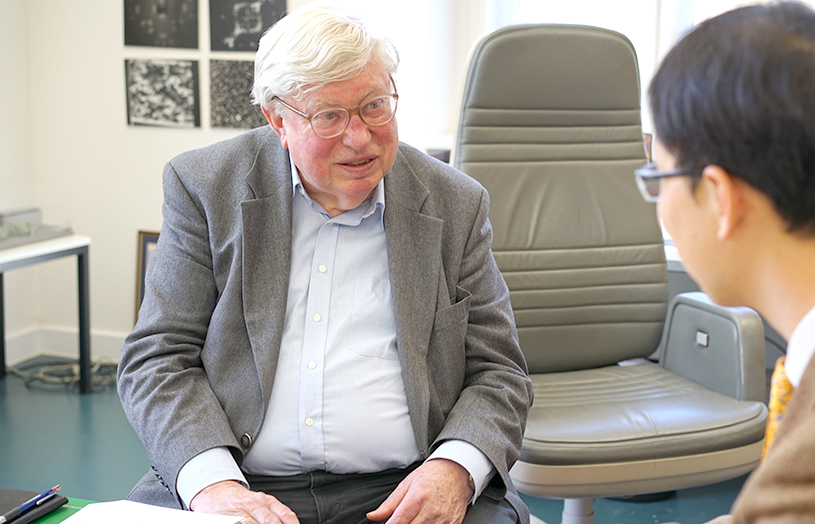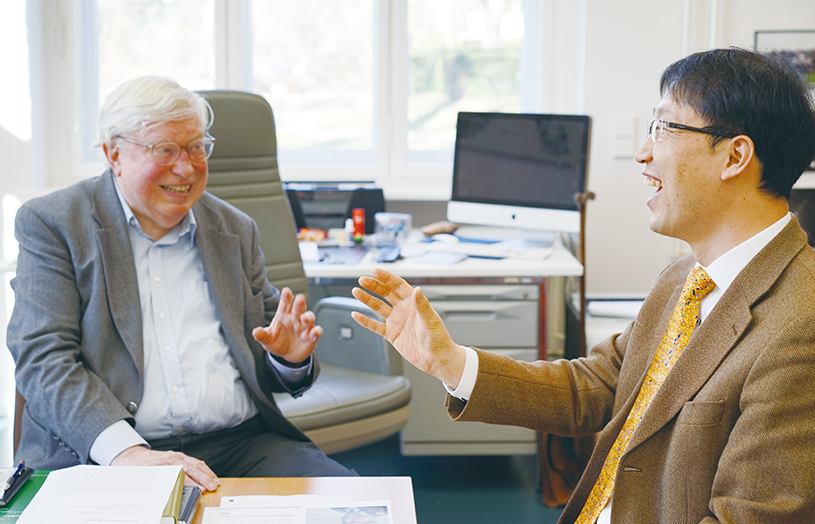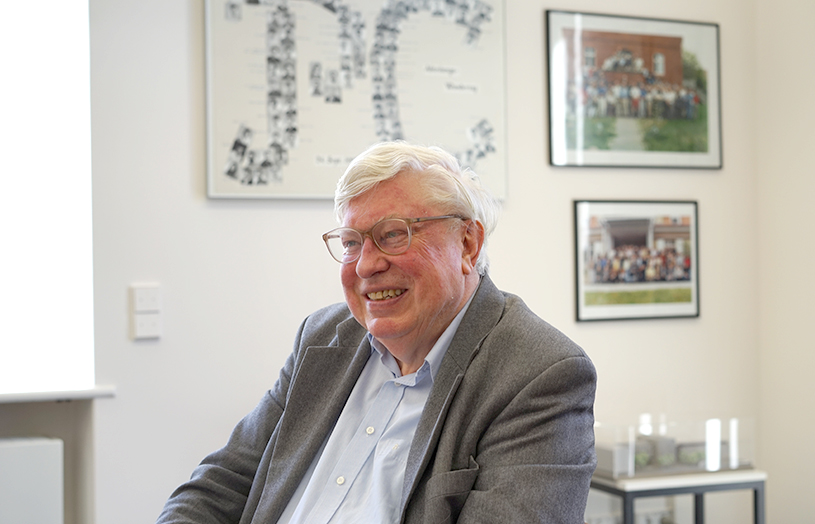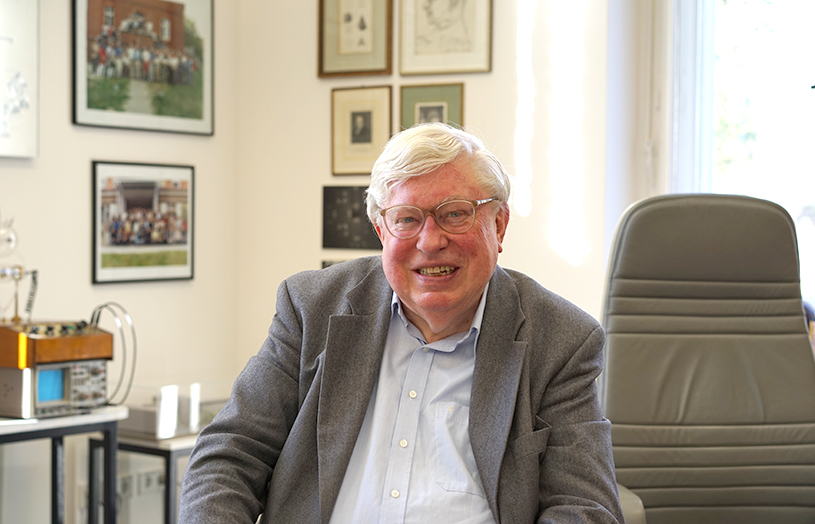Professor Gerhard Ertl was born on October 10th, 1936, when the Berlin Olympics was hosted, near Stuttgart, Germany.
After exactly 71 years, on October 10, 2007, he received a phone call from Stockholm, Sweden. It was inspirational news for
him and his colleagues. “You have been selected as Nobel Prize Winner.” It was a moment the 7th Nobel laureate is born
in Fritz Haber Institute (opened in 1911, it went under the Max Planck Society after the Second World War).
After winning Japan Prize and Israeli Wolf Prize in the early 90s, many projected that he would win the Nobel Prize,
and the news finally came as an unforgettable birthday present, after the wait over ten years.
Professor Ertl authored nearly 700 pieces of scholarly articles, and more than 100 students were awarded a doctorate
degree under him. We will introduce Professor Ertl, with Professor Jae-Young Lee from the School of Earth Sciences and
Environmental Engineering, who has been enthusiastic in realizing a ‘hydrogen economy’ with the Nobel Ertl Center for
Electrochemistry and Catalysis (opened in 2009).
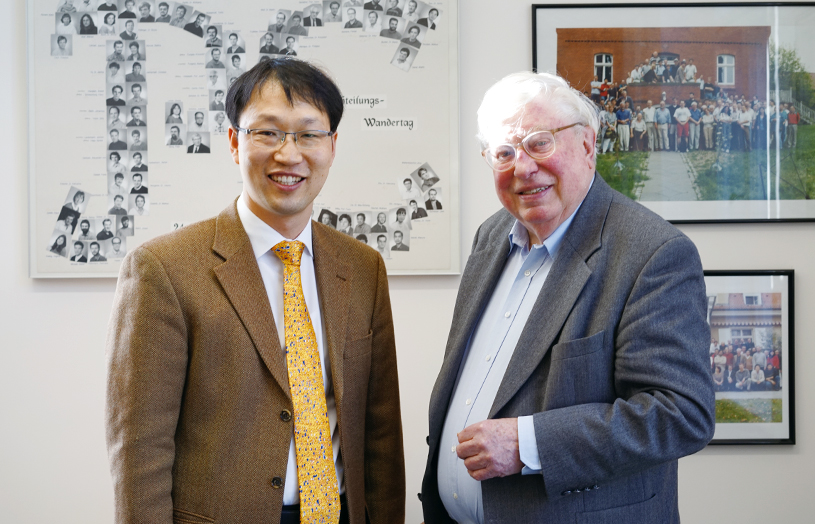
How did you become a scientist, and what do you think you would have done if you did not become a scientist?
When I was in gymnasium, I started to take an interest in chemistry and physics when I was 12 years old.
I first studied physics after I went to college, and then I changed direction to physical chemistry.
During my doctoratal program, the situation around me instilled confidence that I can become a scientist.
If not, I may have become a teacher.
As you mentioned above, you earned your doctorate degree in physics,
but you have performed research in chemistry.
What aspects of physics and chemistry attracted you?
How do the findings of these fields contribute to the world?
The basis of chemistry is physics. Therefore, the two disciplines are actually very closely interconnected, and it can be safely
assumed that chemistry and physics all played an integral role in the advancement of science and technology.
Is there a reason your favorite saying is Vincent van Gogh's saying
'Great things are not done by impulse, but by a series of small things brought together'?
When I look back the experience of myself and my colleagues, scientific advancement is mostly derived from the culmination of small steps by people who devoted their lives with passion. I believe that there is no leap in science that comes from sudden
and unexpected occurrences.
Which achievement do you think was the most impressive in modern science in the 20th century, and why?
Many things happened during the 20th century, including countless discoveries and understandings in the scientific
community. Among those, I believe that the discoveries by Einstein revolutionized the knowledge of our world.
I think that he is a true genius.
Through rapid industrialization, Korea is now a world-class power in application technologies.
However, it still has weak spots in basic sciences.
Recently Korea is showcasing a lot of programs to cultivate the capability in basic research,
including the Institute for Basic Science (IBS), which is modeled on the Max Planck Society.
Could you provide any advice on such efforts?
I have limited knowledge in the cultural background that Korean research society retains and external conditions for basic
science research. If I can mention one thing, the Max Planck Society looks for best scientists in basic sciences and provides them with as much freedom and flexibility as possible. In this context, operating a basic research program in association with IBS will yield positive results.
Korea normally proceeds with scientific research projects in a Project Based System.
Do you think that such method fits with the global trend of the 21st century?
As I do believe that scientific research based on research policies can solve certain issues that the humanity faces, so I think that the research based on PBS is indeed necessary.
You are known to have earned countless awards and honors.
Primarily, you have received the Nobel Prize, Japan Prize, and Wolf Prize.
What played an essential part in achieving such high honors?
The exact reason why a person got those awards is not disclosed to the laureate personally.
However, as for the Nobel Prize, the Swedish Royal Academy of Sciences explained the reason in detail.
I understand you participate in ‘Lindau Conference,’ the society of Nobel laureates.
What is the intention of hosting Lindau Conferences?
I believe that ‘Lindau Conference’ is an ideal ‘platform’ for young scientists from all around the world to motivate their research and to get inspired by the meeting some of the world’s best minds.
Koreans have never received a Nobel prize in an academic discipline, besides the Nobel Peace Prize.
What should be done to see a Korean Nobel laureate?
Many countries are waiting for their turn to have the first Nobel laureate in science. I honestly cannot say what condition a
person needs to receive a Nobel prize. As I mentioned before, it could be possible as a fruit of consistent research activities.
I understand you like to play the piano. When I was doing my doctorate,
I remember you showing us a memorable rendition at a cake party for international students,
which was held every early December. I also heard that you like ‘Starry Night’ by Vincent Van Gogh.
How are arts and sciences related to each other?
I enjoyed playing piano since I was young, and have been impressed with the works of Van Gogh. I think that sciences and arts are all activities of human, and they cannot be separated entirely. In both disciplines, a practitioner must learn basic skills and
optimize them. Both require their own insights and creativity to reach a certain level.
Do you have a topic you want to pursue further?
Even though I am enthusiastic about new research, I am still interested in surface chemistry and catalysts that I have been
working on in my career. I wish that there are more advanced processes and developments to come in this field.
The reputation of professor Ertl can be summarized as “His opinions are worthwhile to listen carefully.” This comment should be something to consider in the modern world, where many people tend to dismiss and not respect arguments and discoveries of others. When I met professor Ertl in 1999, I felt that he was more of a father figure than a scientist.
Amidst his busy schedules, the constant answer to my request to meet was, “Come in, take a seat and talk.”
He is genuinely respected by his colleagues not because he is a Nobel laureate but because he has a genuine interest
in sciences, unrelenting passion, and a kind heart that cares for people around him.


